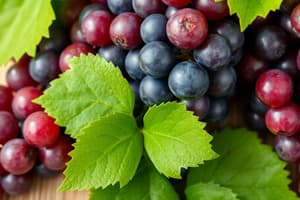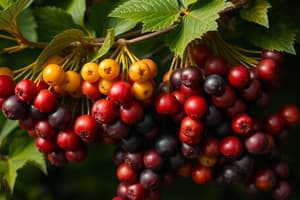Podcast
Questions and Answers
Which compound is most concentrated in green and white teas?
Which compound is most concentrated in green and white teas?
- Theaflavins
- Quercetin
- Catechins (correct)
- Resveratrol
What is the primary reason for the lower catechin levels in black tea compared to green tea?
What is the primary reason for the lower catechin levels in black tea compared to green tea?
- Black tea lacks flavanols.
- Black tea undergoes oxidation. (correct)
- Black tea leaves are younger.
- Black tea is brewed at a higher temperature.
What phenomenon describes the low incidence of heart disease in France despite high animal fat intake?
What phenomenon describes the low incidence of heart disease in France despite high animal fat intake?
- Health Paradox
- French Paradox (correct)
- Dietary Paradox
- Culinary Paradox
Which polyphenol found in grapes is associated with cardiovascular benefits?
Which polyphenol found in grapes is associated with cardiovascular benefits?
Which compound is formed from the oxidation of catechins in black tea?
Which compound is formed from the oxidation of catechins in black tea?
What is one general function of Resveratrol in relation to cancer?
What is one general function of Resveratrol in relation to cancer?
How does Resveratrol contribute to cardiovascular health?
How does Resveratrol contribute to cardiovascular health?
Which component found in grapes is recognized for its antifungal properties?
Which component found in grapes is recognized for its antifungal properties?
What is the concentration of Resveratrol in muscadine grape skins compared to its pulp?
What is the concentration of Resveratrol in muscadine grape skins compared to its pulp?
What role do grape seeds play in relation to oxidative stress disorders?
What role do grape seeds play in relation to oxidative stress disorders?
Which type of grapes contains a higher abundance of flavan-3-ols compared to red varieties?
Which type of grapes contains a higher abundance of flavan-3-ols compared to red varieties?
What health benefits are associated with grapeseed oil used in cosmeceuticals?
What health benefits are associated with grapeseed oil used in cosmeceuticals?
What is one effect of Resveratrol on neuronal cells?
What is one effect of Resveratrol on neuronal cells?
What is the primary factor that determines the type of tea?
What is the primary factor that determines the type of tea?
Which class of tea is described as 'wilted and unoxidized'?
Which class of tea is described as 'wilted and unoxidized'?
What is the process used to stop the oxidation of tea leaves?
What is the process used to stop the oxidation of tea leaves?
What classification do polyphenols fall under?
What classification do polyphenols fall under?
Which of the following is NOT classified as a type of polyphenol?
Which of the following is NOT classified as a type of polyphenol?
Which type of tea is noted for having higher caffeine content due to younger leaves?
Which type of tea is noted for having higher caffeine content due to younger leaves?
Which process of tea leaves is often misreferred to as fermentation?
Which process of tea leaves is often misreferred to as fermentation?
What was a finding from the study conducted in Japan regarding green tea consumption?
What was a finding from the study conducted in Japan regarding green tea consumption?
Which benefit is reported related to tea consumption in the context of cardiovascular diseases?
Which benefit is reported related to tea consumption in the context of cardiovascular diseases?
Which type of tea is wilted, crushed, and fully oxidized?
Which type of tea is wilted, crushed, and fully oxidized?
What is the primary ingredient in all types of tea mentioned?
What is the primary ingredient in all types of tea mentioned?
Which statement reflects a potential misconception about the health effects of black tea?
Which statement reflects a potential misconception about the health effects of black tea?
What is the largest and most studied group of polyphenols?
What is the largest and most studied group of polyphenols?
What percentage of oxidation does oolong tea range from?
What percentage of oxidation does oolong tea range from?
What inconsistency was noted between the British study and other studies regarding tea consumption?
What inconsistency was noted between the British study and other studies regarding tea consumption?
What is a characteristic of polyphenols found in teas?
What is a characteristic of polyphenols found in teas?
Flashcards are hidden until you start studying
Study Notes
What are Polyphenols
- Polyphenols are plant-based chemical compounds containing multiple phenol units per molecule.
- These compounds are categorized into hydrolyzed tannins, garlic acid esters, lignins, and flavonoids.
- Flavonoids are the largest and most extensively studied group of polyphenols, with several thousand compounds, including flavonols and catechins.
Health Benefits of Tea Consumption
- Regular tea consumption, particularly in adults (aged 30-49), is associated with improved cardiovascular health.
- Benefits include lower serum cholesterol levels, reduced systolic blood pressure, and decreased mortality rates.
- A Japanese study linked green tea with higher HDL, lower LDL, and reduced mortality post-myocardial infarction.
- Contrastingly, a British study found no significant correlation between tea consumption and coronary heart diseases.
The Role of Polyphenols
- Polyphenols in tea may provide a protective effect against conditions like atherosclerosis and ischemic heart disease, though mechanisms are not fully understood.
Global Tea Consumption
- Tea is the second most consumed beverage globally, averaging over 100 ml per day, with some areas consuming up to 500 ml daily.
- Worldwide consumption rates average about 0.12 liters per day.
Types of Tea
- All tea varieties originate from the Camellia sinensis plant, which requires substantial rainfall and acidic soils.
- Tea processing influences the type and oxidation level:
- White Tea: Uncured and unoxidized.
- Green Tea: Wilted and unoxidized, quickly processed to preserve polyphenols.
- Oolong Tea: Partially oxidized, ranging from 10% to 70% oxidation.
- Black Tea: Fully oxidized and crushed.
Compounds Found in Different Teas
- White Tea: May have higher caffeine content compared to green teas due to less oxidation.
- Green Tea: Rich in flavanols, particularly catechins, which can range from 100-200 mg per cup. Contains quercetin and other lower concentration compounds.
- Black Tea: Contains lower catechin levels due to oxidation; oxidation products include theaflavins, responsible for the reddish color.
French Paradox and Grapes
- The French Paradox refers to the low incidence of heart disease in France despite high animal fat consumption, linked to regular grape consumption.
- Grape polyphenols, like resveratrol, are believed to offer cardiovascular protection.
Resveratrol in Grapes
- Resveratrol is a polyphenol antioxidant associated with inhibiting cancer, heart diseases, and neurological disorders.
- Found mainly in grape skins and seeds, with concentrations in muscadine grapes being 100 times higher than in pulp.
Antioxidant Properties of Grapes
- Grape seeds contain various polyphenols and other constituents that exhibit antioxidant effects against diseases involving oxidative stress, such as cancer and heart failure.
- Grapeseed oil is utilized in skincare products for its health benefits and antioxidant properties.
Studying That Suits You
Use AI to generate personalized quizzes and flashcards to suit your learning preferences.




